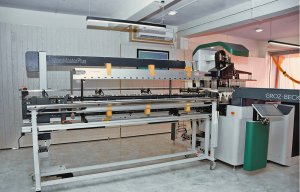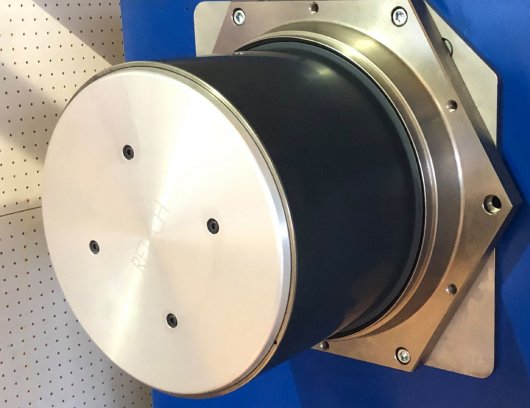
Inauguration of Groz-Beckert weaving showroom in India
New godet rolls made in Switzerland push the boundaries of what’s possible in filament production.

12th October 2021
Innovation in Textiles
|
Meisterschwanden, Switzerland
The popular phrase ‘hanging by a thread’ really means something in yarn applications for protective wear, as well as in applications for the medical, automotive and aerospace industries.
Manmade fibers for these sectors have to fit specifications precisely, to be on the safe side for both producers and end-users – and Retech, based in Meisterschwanden, Switzerland, develops godet rolls as the key manufacturing components to ensure these standards are met.
These threads – some literally life-saving – are made of polyamide, polyester, polypropylene, aramid, carbon and many polymers categorised as technical yarns and high-performance fibres.
Retech has over 45 years of experience, in the heat treatment and drawing of manmade fibres of any material and has just launched two new godet rolls – the Ø 250 model for technical yarns and the Ø 320 for high-performance fibres such as aramids.
Secretive business
“Yarn engineering is a secretive business when it comes to sensitive applications, as well as future developments,” says Retech CEO Ralph von Arx. “Customers build on our expertise and trust ourwide range of key components in meeting requirements such as temperature, speed and torque. But only in rare cases does the customer provide any information about the yarn and its final characteristics. Comparing required customised solutions shows us trends regarding the market demand for godet rolls.”
Identifying a strong demand for technical yarns with maximum strength, Retech developed the Ø 250, with an ideal length of 420mm to process eight or twelve threads at a time. The extended diameter of 250mm allows a significantly higher speed with the same dwell time. Additionally, the higher motor torque guarantees the very best results in yarn tenacity.
Speed can be ramped up to 6,500 m/min – applying a torque value of 15 Nm through the full speed range – and the temperature reaches 250°C with an excellent temperature profile of +/- 1.5 °C over the whole working width of the godet roll. When comparing its performance with the popular Ø 220 series, the achievements become even more impressive, since the speed can be increased further, as well as the torque. These differences make it possible to process a much wider range of yarn counts.
Boundaries
Retech has built a strong reputation for using technology to enable a larger diameter and the required heating capacity within limited space. Results have been excellent, and successful projects also tend to lift expectations even further.
“We continuously touch today’s technical limits and stretch to tomorrow’s possibilities when developing,” says von Arx. “We take the risk, and try to optimise at the edge.”
The new type Ø 320, specially developed for high-performance fibres is evidence of this. It is ideal for serpentine yarn paths to multi-enlacement, and suits practically all machine concepts and yarn paths. For high-performance fibres it’s essential to optimise heat entry into the yarn, so the first step must be to extend the dwell time, which in turn is influenced by speed and diameter. The top diameter of 320mm allows the number of revolutions per minute to be reduced, resulting in optimum dwell time – while taking advantage of an enlarged contact area. Unique yarn characteristics are made possible by impressive operating temperatures of up to 400°C, along with torque values of 35 Nm and speeds up to 1,500 m/min.
Aramids are today the strongest textile fibres and para-aramids generally have high glass transition temperatures nearing 370°C. Heat treatment under tension increases crystalline orientation for unique tension values – all perfected when mechanical drawing orients the polymer chains in the fiber direction. For two reasons, the Ø 320 mm model is the ideal godet to produce sophisticated products such as aramids – it meets technical requirements for heat, torque and speed and it performs to the required precision. Its reliability in use is founded on precise temperature measurements and adjustments – a major aspect of continuous developments.
Improvements
Committed to constant innovation and improvement, Retech engineers have already worked on perfecting the new generation of temperature transmitters successful launched at ITMA 2019. Changes in the temperature control of the individual induction heater zones have improved power input and load distribution. More uniform power input into the inductor reduces the pulsation of the induction heat and prolongs the lifetime of the induction heater itself, as well as of the motor bearings. The smooth-running high-precision drives become even smoother, which brings significant advantages. Monofilament producers, for example, are able to make the finest yarns without the slightest variation in diameter. Last but not least, the changes additionally have a positive effect on the power grid, making its utilisation more even, with fewer peaks, and facilitating a more balanced running of the mill’s system load.

Business intelligence for the fibre, textiles and apparel industries: technologies, innovations, markets, investments, trade policy, sourcing, strategy...
Find out more